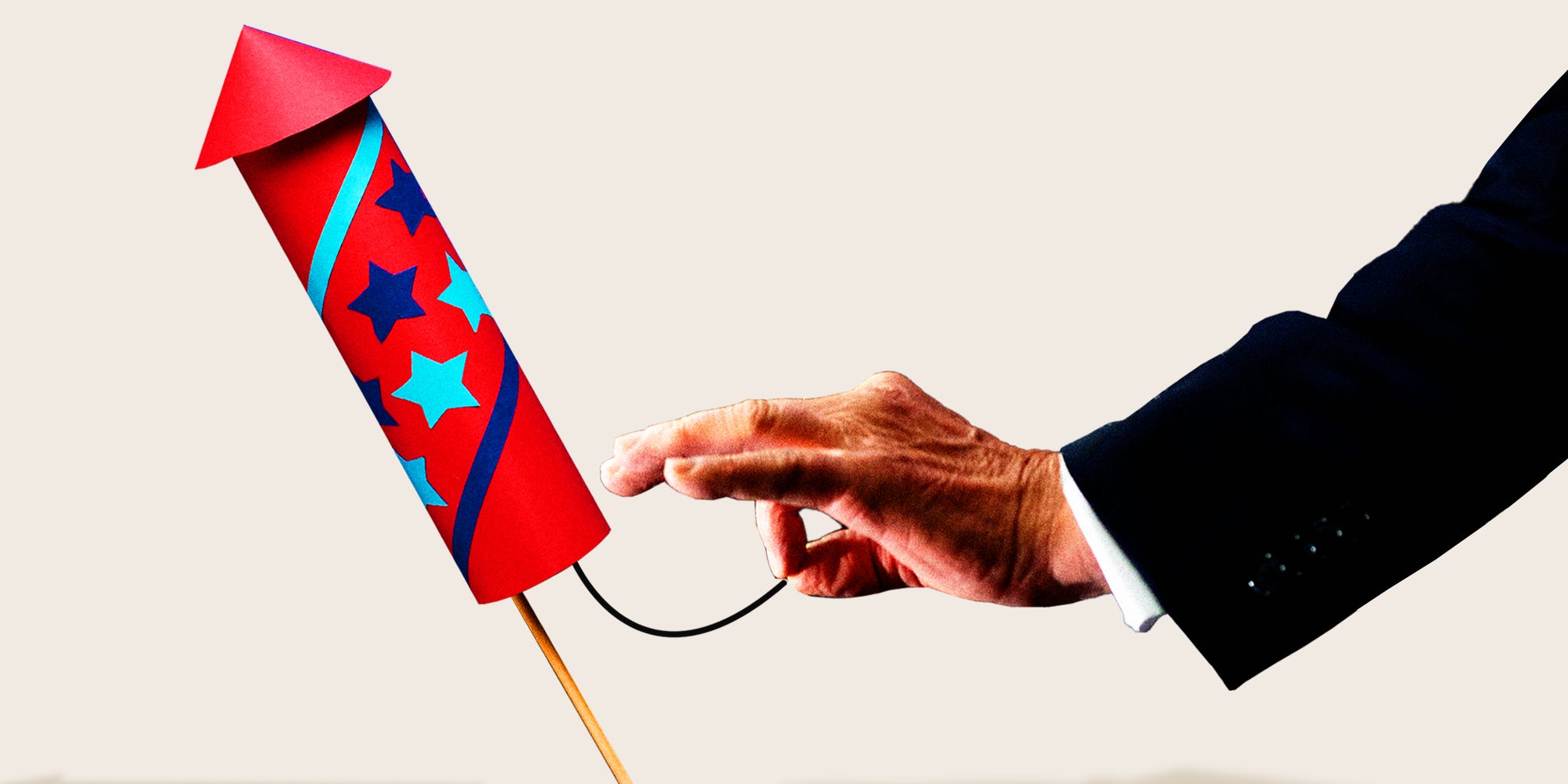
JIM WATSON/Getty, Getty Images; Tyler Le/BI
For a decade, Indiana businessman Bob Hamilton has operated six fireworks pop-ups in the weeks leading up to July 4. Most years, it’s a great business — he says he brings in about $200,000 for a few weeks of work.
But the trade war with China has meant that this year has been anything but normal. And anyone hoping to buy fireworks at the last minute — whether from Hamilton or from pop-ups scattered across the country — is likely to see higher prices and, in some cases, empty shelves.
In the first half of the year, Hamilton watched as the tariffs on Chinese goods went from 10% to 145% and then back down to 30%. Around 95% of fireworks are made in China, so there wasn’t another major market to turn to.
Hamilton played it safe. He bought the bulk of his inventory in April — just before the 145% tariffs took effect — to lock in a better price. He borrowed space from one of his other businesses, a commercial flooring company, to store his merchandise. Assuming that higher prices would mean fewer sales, he leased just four storefronts. “By the time we figured out how to navigate this tariff thing for this year, it was a little bit too late in the game,” he says.
But the chaos seems to have wiped out some of Hamilton’s competition. This week, when he placed another order to restock his shelves, the cost factored in the 30% tariff. “How much of that do we eat to keep our customers happy?” he says. Hamilton ultimately decided to split the difference with his customers.
Trump has called them the America First tariffs. The bitter irony is that the tariffs are raining on the most iconic celebration of America.Julie Heckman, executive director of the American Pyrotechnics Association
From fireworks to backyard barbeques, President Donald Trump’s America First tariffs are getting in the way of America’s birthday bash. While the biggest impact has fallen on the fireworks industry, the higher tariffs — coupled with stubbornly high consumer prices and a historic low in the American cattle supply — have jacked up the cost of beef, ice cream and other Independence Day staples.
This year’s price hikes and shortages could preview an even bigger impact on next year’s celebrations, when Americans will mark the nation’s 250th birthday. Industry watchers say there’s a real risk of product shortages and significantly higher prices in 2026.
“Trump has called them the America First tariffs,” says Julie Heckman, the Executive Director of the American Pyrotechnics Association. “The bitter irony is that the tariffs are raining on the most iconic celebration of America.”
The question leading into 2026 is largely one of capacity: Will orders come in soon enough, and will there be enough time for producers in China to meet the American demand for pyrotechnics?
Chinese manufacturers are making up lost time from last year, and — in advance of America’s 250th — the APA expects next year’s demand for fireworks from American consumers to surge by 40 to 50%.
Uncertainty in the US market after high tariffs took effect meant that Chinese manufacturers “lost several months of vital production time,” says Heckman. “That’s what’s really going to impact 2026.”
Fireworks are constructed by hand and take up to two days to make, so delays have a meaningful impact. “It’s a very laborious and dangerous process,” says Heckman. “Think of papier mache layers over a sphere, like wrapping a basketball, gazillions of times.” Before the firework is finished, it’s placed in the sun to dry.
Stacy Schneitter Blake, president of the National Fireworks Association and co-owner of Schneitter Fireworks & Importing in St Joseph, Missouri, echoes Heckman’s concerns.
July 4 is Americans’ second-favorite holiday, after Christmas. And demand for fireworks will likely surge ahead of America’s 250th birthday in 2026.
The brief window of 145% tariffs this spring “severely disrupted” the supply chain, she says. “Thousands of containers were canceled or delayed, municipal displays were downsized or cut entirely, and companies across the country are absorbing unrecoverable losses.”
Industry watchers say China’s strong domestic market for fireworks and a strong European market also mean that Chinese manufacturers aren’t dependent on American buyers.
“There’s only so long that companies can kind of dance around these tariffs and figure out clever ways to adjust for them, to prevent the price increases from flowing through to consumers,” says Martha Gimbel of the Budget Lab at Yale, a non-partisan policy research center. “To paraphrase the classic Christmas song, ‘Have yourself a merry little Fourth of July,’ because it may be your last without price increases.”
Hamilton, who says he supported Trump for president, says he’s OK with all the uncertainty — for now — especially if it means Americans will get a better deal in the long run. “Do we all wish we weren’t paying these extra tariffs? Absolutely,” he says. “But I’m willing to sacrifice if I need to, for the greater good.”
“The question I’m looking at is, what does this look like next year, the year after?” he says. “Is this going to correct itself?”
Fireworks are the symbol of Independence Day celebrations. But most popular way to mark Americans’ second favorite holiday, after Christmas, is with a cookout, according to Northwestern University’s Medill Spiegel Research Center, which tracks consumer behavior.
This year, those researchers predict a 5% drop in Independence Day celebrations, largely due to higher prices.
Andrew Lokenauth is among those who are cutting back.
“These tariffs that were supposed to put America first are making it harder for Americans to celebrate America.”
For 15 years, Lokenauth has gone all-out for the Fourth of July. The barbecues that he and his wife host in their Tampa, Florida backyard include fireworks, a professional sound system, and mountains of food for 150 guests.
“My signature move was always smoking these massive briskets — started them at 3 a.m. to get them perfect by party time,” says Lokenauth, who’s 38 and works as a financial educator. “And the spread, man, the spread. We’d have everything from pulled pork to grilled chicken. Plus, all these sides my wife makes that everyone fights over.”
The party was reliably “the highlight of summer for our friends and family,” he says.
But a few weeks ago, Lokenauth discovered that the price of everything from fireworks to that brisket was way up, and he calculated he was $2,000 over his usual budget.
Lokenauth and his wife now plan to host a much smaller party, and make it a potluck. “After 15 years of going all out, it wasn’t an easy decision,” he says. “It felt like cutting off my right arm.”
Natalie Flynn, who lives in Washington, DC, can relate.
Every year, she squeezes around 30 guests into her 600-square-foot Washington, DC, apartment. Her bathtub becomes the cooler for beer and cocktails, while she grills hot dogs and hamburgers from her building’s roof. She makes almost everything from scratch — her homemade ice cream sandwiches are a reliable favorite. At around 8, she hands out sparklers and leads her guests on a walk to the National Mall, where they watch fireworks go off over the Lincoln Memorial. “It’s this moment of just joy and jubilance,” he says.
But a couple of weeks ago, Flynn was taken aback when she noticed that the 5.5 pound bag of Belgian chocolate chips she uses for her ice cream sandwiches are $76 this year, up from $53. Flynn, who’s 36 and works two jobs, realized that her particular salute to Uncle Sam was suddenly outside her budget.
Flynn’s party will now also be a potluck, and there will be fewer sparklers to pass around. “Stuff’s not going to get cheaper, so I have to be more mindful of how I spend,” she says. “The feast has gotten too expensive.”
Both Lokenauth and Flynn say they hope this year counts as a blip and that they’ll get back to hosting massive Fourth of July parties again soon.
“I’ve always believed the beauty of America is how we can disagree but still fire up the grill together,” says Lokenauth. “I’ve got friends who voted Trump sitting next to folks who voted Harris — and they’re both reaching for the same plate of brisket.”
“These tariffs that were supposed to put America first are making it harder for Americans to celebrate America,” he says.
Cari Shane is a freelance writer.
Dominick Reuter is a senior retail reporter for Business Insider.
The post Trump’s America First tariffs are raining on America’s birthday parade appeared first on Business Insider.




